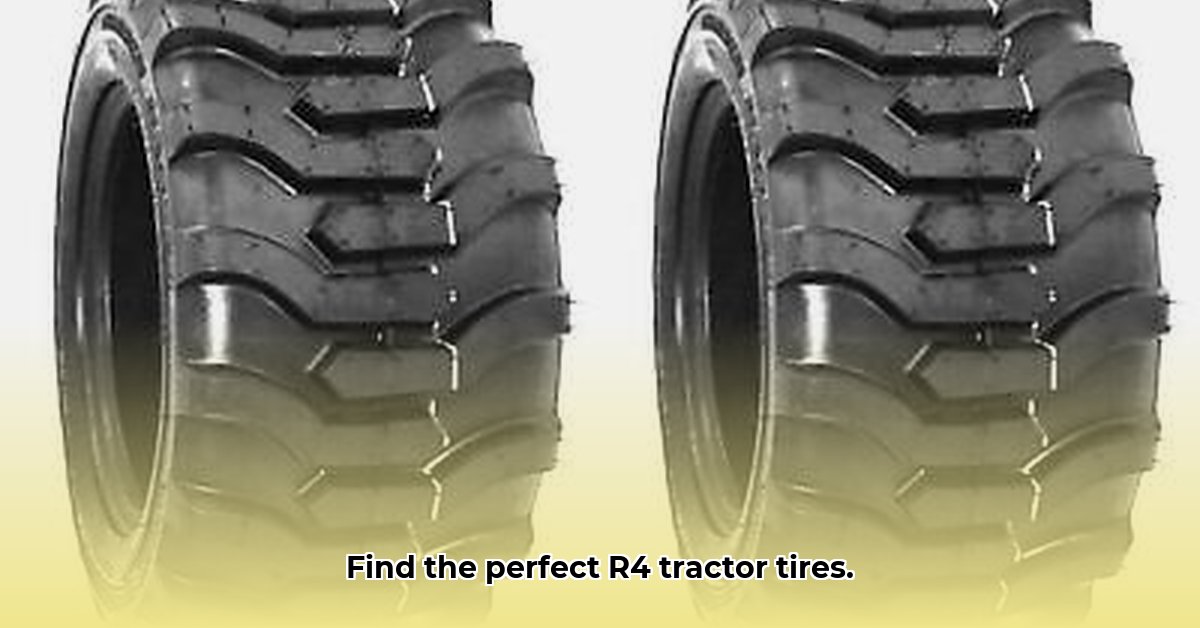
Choosing the right tractor tires is crucial for farm efficiency and profitability. This guide focuses on R4 tractor tires, comparing them to R1 and R3 types to help you make an informed decision. We'll cover tire selection, maintenance, and risk mitigation, ensuring you get the most out of your investment. For more information on tire fluid, check out this helpful resource: learn more.
Understanding Tractor Tire Types: R1, R3, and R4
Three primary agricultural tire types exist: R1, R3, and R4, each suited for specific terrains and tasks. R1 tires feature deep treads for maximum grip in mud and snow – ideal for heavy fieldwork in challenging conditions. Conversely, R3 tires have shallow treads, minimizing ground disturbance and protecting sensitive surfaces like lawns; they're perfect for landscaping and turf maintenance. R4 tires offer a versatile balance between traction and surface protection, making them a popular all-around choice for many farmers.
R4 Tractor Tires: A Detailed Look
R4 tires represent a compromise between the extreme grip of R1s and the surface-protecting nature of R3s. They're known for their versatility, performing well across a range of terrains, from hard-packed soil to paved roads. Their tread pattern provides sufficient grip for most tasks without causing excessive soil compaction. However, they might not be optimal in exceptionally muddy or rocky conditions.
Strengths of R4 Tractor Tires:
- Versatility: Effective across various terrains.
- Balanced Traction and Protection: A good compromise between grip and ground protection.
- Suitable for Mixed Use: Comfortable on both fields and roads.
Limitations of R4 Tractor Tires:
- Not Ideal for Extreme Conditions: May not provide the grip of R1s in challenging terrains.
- Slightly Increased Wear on Soft Soils: May wear faster than specialized tires on extremely soft surfaces.
Comparing R1, R3, and R4 Tires: A Side-by-Side Analysis
The following table summarizes the key characteristics of each tire type:
| Tire Type | Traction | Turf Protection | Terrain Suitability | Typical Use |
|---|---|---|---|---|
| R1 | Excellent | Poor | Soft, muddy, snowy | Heavy fieldwork in challenging conditions |
| R3 | Moderate | Excellent | Delicate surfaces, lawns, manicured fields | Landscaping, turf maintenance, light fieldwork |
| R4 | Good | Good | Mixed terrains, hard-packed soil, roads | General farm work, transport, mixed operations |
Selecting the Right Tractor Tires: A Decision-Making Guide
Choosing the right tires depends on your specific needs. Consider these crucial factors:
Primary Terrain: Predominantly hard-packed soil? R4s might be ideal. Mostly soft soil? R3s or even R1s (depending on conditions) might be more suitable. A mix? R4s offer a good balance.
Workload Intensity: Heavy-duty applications might necessitate more robust tires than lighter workloads.
Budget: Tire prices vary. Consider not only upfront costs but also the long-term impact of durability and fuel efficiency.
The following decision tree can help guide your selection:
- Mostly hard surfaces? Yes → R4. No → 2.
- Mostly soft surfaces? Yes → R3 (consider R1 for extreme conditions). No → 3.
- Mixed terrain? Yes → R4.
Maintaining Your Tractor Tires: Extending Lifespan and Performance
Proper maintenance significantly extends tire lifespan and performance. Follow these essential steps:
Regular Pressure Checks: Maintain recommended inflation pressures for optimal traction and fuel efficiency. Underinflation increases wear and poor handling, while overinflation can damage the tire.
Visual Inspections: Regularly check for cuts, excessive wear, embedded debris, and sidewall damage.
Tire Rotation: Rotate tires periodically for even wear and maximum lifespan.
Proper Storage: Store tires away from extreme weather conditions when not in use.
Mitigating Risks Associated with Tractor Tire Use
While R4 tires are versatile, they have limitations. Using the wrong tire type for a specific terrain significantly increases the risk of damage and inefficient operation. Mitigation involves:
- Correct Tire Pressure: Maintain recommended inflation levels for optimal performance and safety.
- Appropriate Terrain Selection: Choose tires suited to the terrain type.
- Regular Inspections: Frequent checks prevent minor issues from becoming major problems.
- Professional Consultation: Consult with tire experts for personalized advice.
Conclusion: Choosing the Right R4 Tractor Tire for Your Farm
Selecting the correct tractor tires is a vital investment. This guide provides a framework for informed decision-making, emphasizing the importance of understanding tire types and their respective strengths and weaknesses. Remember to consider your specific operational needs, budget, and the importance of regular tire maintenance for long-term performance and cost-effectiveness.